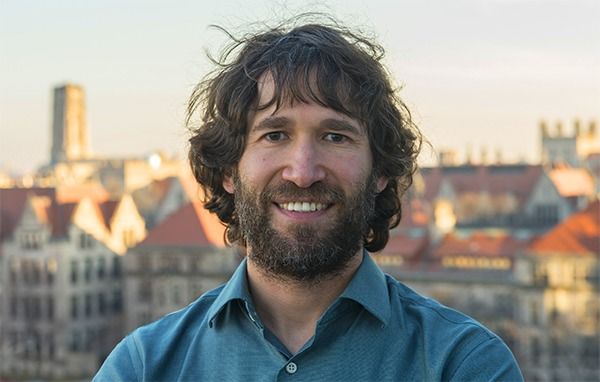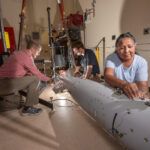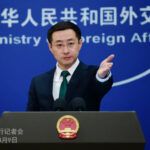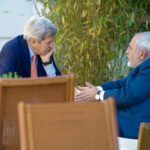Mastermind or madman? Putin shows why the world needs new nuclear agreements
By Daniel Holz | March 17, 2022
 Daniel Holz
Daniel Holz
Over the span of two weeks, Russian President Vladimir Putin has transformed the delicate political balance that has held for the last half century. We are now witnessing the largest land-war in Europe since World War II, but this time with the addition of vast competing nuclear arsenals. Putin test-launched nuclear-capable ballistic and cruise missiles last month, put his nuclear forces into “special combat readiness,” and has darkly threatened any country interfering in Ukraine with consequences “you have never seen in your history.” We appear to be hurtling towards a renewed Cold War between Russia and the West, with the social and economic integration accomplished over the past three decades evaporating at breakneck pace.
It is unsettling that one human being can have such outsize influence on global stability. This has led to widespread armchair psychiatry focused on Putin’s mental state, with two broad possibilities generally considered: he is brilliantly manipulative or profoundly unhinged. There is a third possibility that might also be worth considering: Putin is a straight shooter telling the world exactly what he believes, as delusional as it sounds.
Regardless of Putin’s mental state, the invasion of Ukraine has made one thing clear: As soon as hostilities end, Western leaders need to engage with Putin and Chinese leader Xi Jinping to craft agreements on arms control and nuclear command and control practices that greatly reduce the possibility that any one person can take actions that put the whole of human civilization at risk.
In the first mental archetype, Putin is masterfully manipulating the rest of the world. His K.G.B. background makes him uniquely able to assess his opponents and exploit their vulnerabilities. This is the crafty spymaster Putin who influenced then-President George W. Bush to utter, “I looked the man in the eye. I found him to be very straightforward and trustworthy… I was able to get a sense of his soul” and similarly then-President Donald Trump to profess, “Every time he sees me he says, ‘I didn’t do that,’ and I really believe that when he tells me that, he means it.” In this telling, Putin is a sly and cunning opponent who has feigned becoming unhinged. This unsettles the rest of the world, impelling other leaders to give him a wide berth and acquiesce to his extreme behavior. By this analysis, Putin is cold and calculating, but not insane. He has no intention of actually blowing up the world. But the threat of nuclear apocalypse can help him achieve his desired goals without the need to carry through.
At first blush, the brilliant Putin option seems reassuring. No rational person would ever willingly cause a global catastrophe, after all. Fans of this interpretation advise us to dismiss Putin’s threats as empty bluster. However, this ignores the risks of inadvertent escalation. Putin is playing with fire, and—even if he does not actually plan to use nuclear weapons—we may all get burned. After all, whatever Putin’s intentions when invading Ukraine, it is hard to imagine that things are going to plan. Two weeks in, Kyiv is still in Ukrainian hands, and the Ukrainian government still stands. Putin is being humiliated on the global stage by Ukraine’s relatively tiny military and former-comedian president. The unexpectedly broad and unprecedented sanctions are having a debilitating effect on the Russian economy, with the ruble in free fall and Russia’s oil becoming a toxic commodity.
After years of building itself up as a respected global player, Russia has been laid low economically, militarily, and morally. Russia’s fall from grace has been startlingly swift. The invasion has produced precisely what it was likely meant to prevent: a unified anti-Russian Ukraine, an invigorated NATO with additional countries clamoring to join, a stronger alliance among Western countries, and a revitalization of US global leadership. When cornered, with no good options, Putin may feel he is forced to lash out. The one thing he does have, in spades, is nuclear weapons. These would require the world to pay attention and take him seriously. Even though he may not have had any intention of ever using a nuclear weapon, he may find himself in a scenario where he perceives no other option. The complete and utter humiliation of losing the war in Ukraine while watching Russia disintegrate under sanctions may be too much for him to bear, psychologically.
On the other hand, perhaps Putin is unhinged and mentally unsound. This could be the result of age or a physical or mental ailment. By all accounts he has been in self-imposed extreme isolation during the pandemic, which may have taken a mental toll. Or perhaps being surrounded by sycophants, an inevitable result of brooking no dissent, has left him so disconnected from reality that he is unable to make rational decisions. Perhaps he believes he is the reincarnation of Peter the Great. If he truly has lost his grip on reality, he could very well bring civilization to an end in a fit of pique or because he’s having a bad day. Rational self-interest, the assumption of mutual assured destruction that underlies nuclear deterrence theory, would then no longer hold sway. Although the Russian nuclear authorization process has not been made public, as with the US president, Putin likely holds direct authority to launch Russia’s vast arsenal of nuclear weapons. In Putin’s case, this could mean that if he doesn’t win the war in Ukraine, he’ll blow up the world to make sure nobody else wins.
There is also a third psychological state to consider: perhaps Putin is telling us exactly what he truly thinks. He has called the collapse of the Soviet Union the “greatest geopolitical catastrophe.” In his speech on the eve of the Ukrainian invasion, he told us, “For our country, it is a matter of life and death, a matter of our historical future as a nation. … It is not only a very real threat to our interests but to the very existence of our state and to its sovereignty.” Taking him at his word, he may genuinely believe that the West is intent on destroying Russia. He may be convinced that if Ukraine were to join NATO, then Russia would inevitably fall, taking the Russian people, culture, language, and civilization with it. Within this mindset, Putin’s invasion was a desperate act of self-preservation.
Over the past two weeks, a unified West has not only gone well beyond expectations in providing military and humanitarian aid to the Ukrainians; it has also taken unprecedented steps to isolate Russia and decimate its economy. The French Finance Minister described Russia’s ejection from the SWIFT banking network as the “financial nuclear option.” From Putin’s point of view, this response could confirm his worst fears: The West is indeed intent on destroying Russia and leaving nothing behind. Through this lens, Putin may be willing to risk the destruction of the planet to achieve his aims, since he is convinced that the West will destroy Russia otherwise. This view may be widely shared among a broad cross-section of Russian society. For example, TV host Dmitry Kiselyov has opined, “Why do we need a world if Russia is not in it?” This type of rhetoric suggests that the current troubles may not begin and end with Putin. We would be wise to avoid over-personalizing the situation.
Regardless of Putin’s mental state, the world faces an exceedingly dangerous moment. That the fate of humanity depends on the mental state of one individual is what is truly crazy. The world needs to engage with Russia as if our lives depended on it. The current situation should focus attention on the many actions we can take to make the world safer for all, including renewed arms control with Russia, ending launch on warning and sole authority, and adopting pledges of no first use and encouraging Russia and China to do likewise. These actions would make it less likely that the war in Ukraine will lead to a nuclear catastrophe. These actions would make it more likely that civilization will survive for generations to come.
Editor’s note: This piece is part of a collection of commentary and analysis by Bulletin Science and Security Board members on the Russian invasion of Ukraine. The full collection can be found here.
Together, we make the world safer.
The Bulletin elevates expert voices above the noise. But as an independent nonprofit organization, our operations depend on the support of readers like you. Help us continue to deliver quality journalism that holds leaders accountable. Your support of our work at any level is important. In return, we promise our coverage will be understandable, influential, vigilant, solution-oriented, and fair-minded. Together we can make a difference.
Keywords: Dmitry Kiselyov, Putin's mental state, Russia, Ukraine, arms control, nuclear threats
Topics: Analysis, Nuclear Weapons















The fact that Russia test it’s nuclear weapons should give the author reason to understand how severe the conflict have become. Note become. Russian’s feel threatened by Nato/US expasion on Russian border, it is not hard to understand they feel cornered. Have the author of this article already forgot about the Cuban missile crisis?
Instead of calling people “madman”, try understand the logic and how russians are seeing the situation. Slurs wont help us.